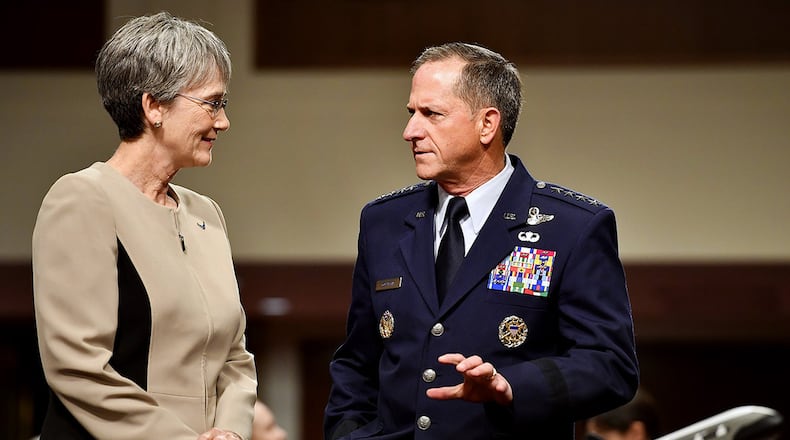RELATED: House defense leader at Wright Patt, says AF pilot shortage growing
Wilson said sequestration, or defense spending reductions under the Budget Control Act of 2011, had eroded readiness and contributed to the woes of retaining experienced aviators.
“Sequester is still the law of the land,” Wilson said. “If we go through another sequester again, a 2,000 pilot (shortage) will be a dream. People will walk.”
Air Force Chief of Staff Gen. David Goldfein said the Air Force planned to ramp up flight school production to 1,400 pilots earning their wings every year, up from about 1,200 annually today.
“What keeps me up is if we can’t move past sequestration in its current form, we’re going to break this force,” Goldfein told reporters.
RELATED: Some of U.S.’s most secretive work will be at new NASIC building
The 1,926 pilot shortage represents almost one out of 10 pilots of the 20,000 who serve in the Air Force, Air Force Reserve and Air National Guard, officials said.
The White House also recently expanded Air Force authority to call back the retired pilots, but in tightly limited numbers that will not come close to closing the gap.
House Armed Services Committee chairman and U.S. Rep. Mac Thornberry, R-Texas, visited Wright-Patterson last month and announced the Air Force pilot shortage had reached about 1,900 aviators.
In March, the Air Force said it was short 1,555 pilots, and of those 1,211 were fighter pilots. In response, the service branch offered figther pilots up to $455,000 in bonuses over 13 years to remain in uniform, and extended financial incentives to other areas short of workforce needs.
Wilson said the Air Force’s additional priorities are modernizing the fleet, including nuclear-tipped missiles and bombers, launching a 12-month review of science and technology research programs, developing leaders, and strengthening U.S. military alliances around the globe.
But it was the budget and the ongoing concerns over sequestration that dominated the two leaders conversation.
“Our biggest need right now is for a higher and stable budget,” said Wilson, a former New Mexico Republican congresswoman.
RELATED: AF secretary in exclusive interview talks about BRAC, security threats
Wilson said during “State of the Air Force” address Thursday that was streamed live from the Pentagon the Air Force was investigating what led to the service branch’s failure to report the military criminal conviction of two domestic assault charges against the alleged gunman, 26-year-old Devin Patrick Kelley, in a Texas church shooting massacre that killed 26 and injured 20 on Sunday.
Authorities said the former airmen died of a self-inflicted gunshot wound after a high-speed chase with two bystanders. One of them apparently shot Kelley at least once before the pursuit, reports said. Kelley had been stationed at Holloman Air Force Base, N.M., and sentenced to a year in a Navy brig near San Diego.
The Air Force has confirmed it failed to report Kelley’s conviction to the FBI’s National Crime Information Center, which would have prevented him from legally purchasing a firearm, the service branch said.
“We are looking at all of our databases and if we have problems we find, we’ll fix them,” Wilson said.
About the Author
